In the wake of seasons changing, colds and flu spreading, and virus outbreaks, there is one question on everyone’s mind: how can I improve my immune system? In this in-depth article, I will share some scientifically studied minerals, vitamins and supplements for the immune system. I will also talk about how the immune system works and what else you can do to boost it.
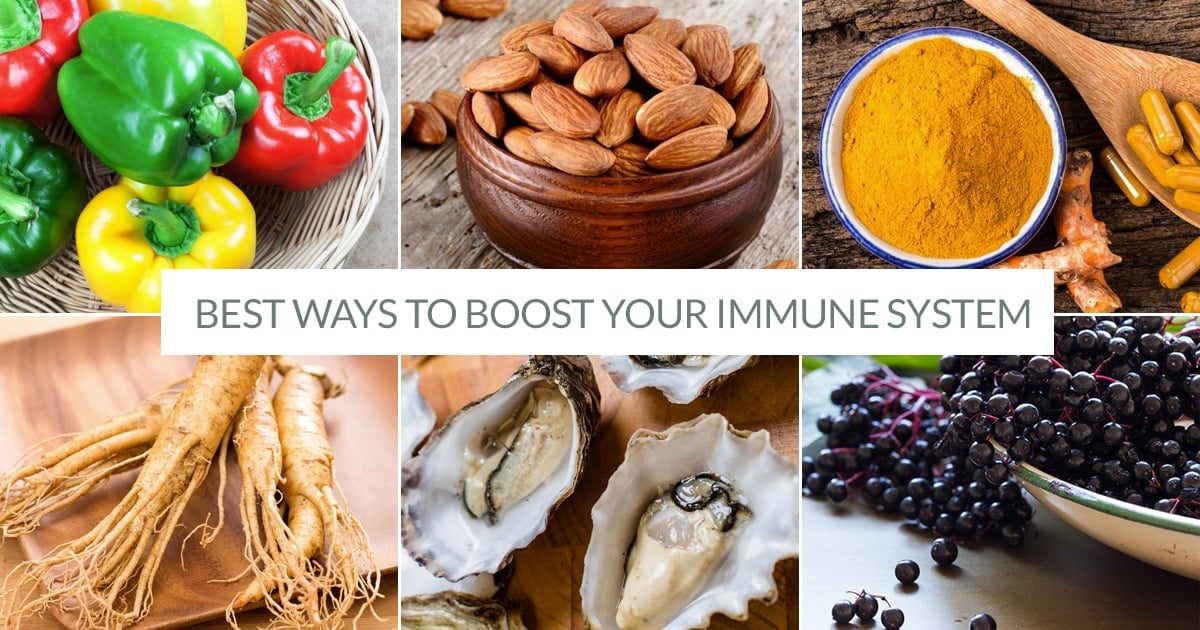
If you’re travelling, doing intense exercise, recovering from illnesses, feeling stressed or tired, it is possible your immune system will be under pressure. You may feel worried about exposure to germs or anxious about the potential. Here is everything you should know about boosting your immune system.
Disclaimer: As a nutritional adviser, I am sharing the knowledge and advice I’ve acquired during my nutrition studies and the scientific research I’ve done in my own time. These are just general guidelines and you should always consult with your health professional before supplementing, especially if you take other medication or have pre-existing conditions.
How I structured this article: I focus on essential vitamins and minerals first, and as they are the most important, you will find more detailed information. I then go into other supplements and herbs for the immune system and finish up with some general lifestyle advice. If you don’t have the time, look out for ‘In the nutshell’ bits to get a quick overview or read the Conclusion.
Jump directly to the topic
- How does the immune system work?
- Vitamin C
- Zinc
- Vitamin D
- Vitamin E
- Probiotics & prebiotics
- Elderberry
- Echinacea
- Ginseng and astragalus
- Curcumin
- Larch Arabinogalactan
- Bovine colostrum
- Spirulina
- Other things we can do to enhance our immune system
- Conclusion
- References
How does the immune system work?
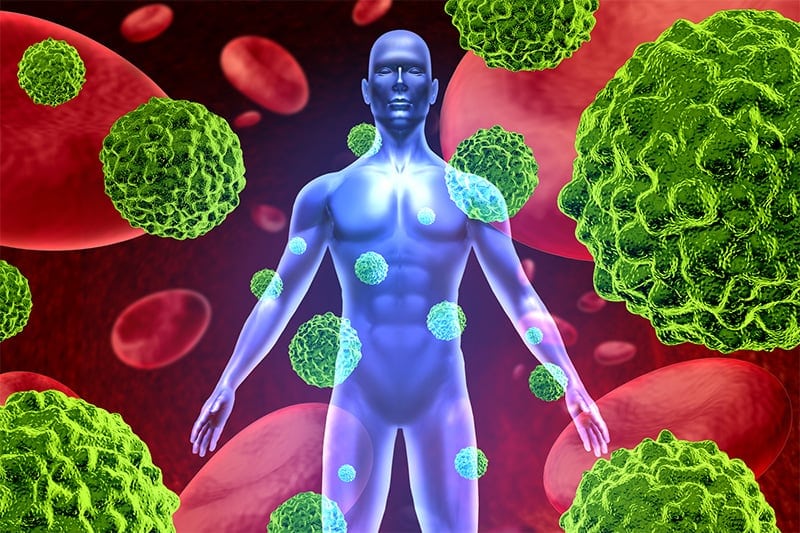
In essence, of course, the immune system protects the body from falling ill in the first place. When it inevitably happens, our immune system kicks into gear to make sure we recover. Our immune system is a well-oiled machine in most healthy individuals. Babies, elderly people, and immunocompromised individuals are easier targets and should take extra precautions based on their unique status.
The main functions of the immune system are fighting germs such as bacteria, viruses, and parasites, neutralising environmental hazards to protect our bodies from them, and battling “disease-causing changes in the body, such as cancer cells” (1).
The immune system doesn’t reside in one place in our bodies. Rather, it’s a network of cells, molecules, tissues, and organs. Popular examples are helper T cells and killer T cells. Helpers send signals, and killers attack infected cells.
Another component is our skin. As our body’s largest organ, it has a plethora of functions. Naturally, it protects us from countless toxins while also being home to its own immune cells.
Finally, organs like the lymph nodes and spleen provide filtering services (2). These are just a few important components and functions of the individuals who run the immunity show!
The immune system is also quite intelligent. Considering it’s always fighting off, filtering through, and responding to unrecognised intruders, it’s imperative that it keeps organised records. The immune system archives information about antigens – things like bacteria that trigger an immune response – and knows exactly when to double up on defence.
Innate vs Adaptive Immunity
Innate immune system. This system doesn’t discriminate when it comes to fighting. If it comes in through the digestive system or the skin, the innate immune system is in charge. This can also be referred to as the ‘non-specific immune system’ (1).
Adaptive immune system. When the body comes into contact with certain antigens, it will gradually develop defences. Also known as the acquired immune system, this is a learned set of skills (1).
Now, that you’ve got a quick lowdown on the functioning of the immune system, let’s have a look at what we can do to keep it optimised and ready for a fight!
BEST VITAMINS FOR BOOSTING THE IMMUNE SYSTEM
Vitamin C
Most people probably think of vitamin C as immune defence, considering supplements like Emergen-C are marketed to prevent the onset of illness, and orange juice is a popular recommendation amongst the sickly. So, is Vitamin C worth the hype?
In short, yes! It’s an important vitamin and antioxidant for the immune system as well as iron absorption, building, repairing and maintaining healthy tissue and cells, and wound healing.
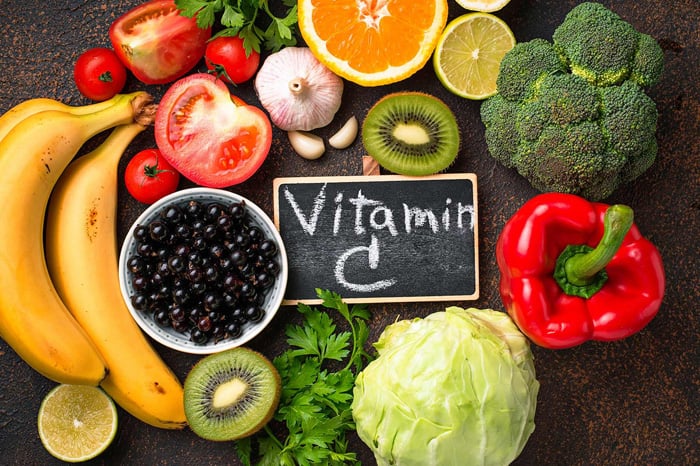
Sciency bit: There is a good deal of science that confirms vitamin C as an effective supplement, remedy, and support. While vitamin C doesn’t necessarily prevent you from catching a common cold, but it can shorten the duration of it (7). It boosts cellular functions of both the innate and adaptive components of the immune system, protects against oxidative stress (it is a free radical scavenger), and decreases necrosis and tissue damage.
Supplementation can prevent and address infections of the respiratory system, have antimicrobial benefits, and improves natural killer cell activity (7). Moreover, deficiency results in impaired immunity and higher susceptibility to infections (3).
How much vitamin C should I have? As an example, the recommended daily intake of vitamin C in the UK is 40mg per day for healthy adults and you can easily get it from eating a variety of fruits and vegetables. One medium orange has 70mg of vitamin C. However, higher intakes may be needed for optimum antioxidant protection. In the US, the recommended amount is 75-90mg per day. Many people (me included!) take 1000mg of vitamin C supplement daily throughout the winter months or flu season.
Can you take too much vitamin C? Well, vitamin C cannot be stored and any excess will be lost in the urine. Very high doses (over 1000-2000mg) taken as a supplement can lead to some uncomfortable symptoms including diarrhoea and kidney stones in some individuals. Personally, I believe in the efficacy of higher vitamin C intake but you don’t need to take a supplement as you can get plenty from food alone.
By the way, smoking increases the body’s use of vitamin C so extra 35mg per day is recommended!
Best sources of vitamin C: Oranges, lemons, rose hips, chili pepper, bell pepper or capsicum, kale, spinach, broccoli, Brussels sprouts, cabbage, white potatoes, cauliflower, papaya, blackcurrant, kiwi, all berries, tomato and tomato juice, mango, thyme. A multivitamin or vitamin C supplement (also known as ascorbic acid). Check out more vitamin C foods here.
Tip: To get the most vitamin C from food avoid overcooking the vegetables and make sure to eat some raw stuff. Salads, steaming and stir-frying are the best cooking methods. If you’re boiling veggies, keep the broth or use it in soups.
In a nutshell: Vitamin C is legit and you can get plenty of it from fruit and vegetables, which you can increase if you feel like your immune system is underperforming. Extra vitamin C can be beneficial but there is no need to go over 1000mg/day unless advised by your doctor. Get into those healthy salads!
ZINC
Zinc is a mineral that is present in all tissues. It’s essential for growth, repair and sexual maturation and health; and, is needed for other enzymes to play their role in your body functions. Like vitamin C, it’s a potent antioxidant. It is essential in the production of superoxide dismutase, an enzyme that collects and removes free radicals, and plays a key role in the body’s immune system.
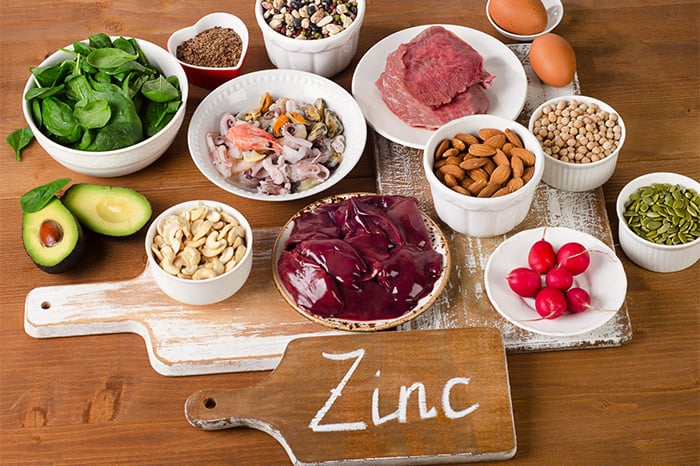
Sciency bit: Many individuals can be deficient in zinc. It’s particularly common in developing countries and in the elderly population. In fact, it is the fifth leading cause of disease or loss of vitality in developing countries (5).
The key to zinc’s power is balance! Too little zinc impairs both the innate and adaptive immune system by damaging cellular mediators (4). Too much zinc can actually lead to similar problems. This is why zinc homeostasis (balance of zinc with other elements) is so crucial to immunity, both to defend against invading pathogens and to regulate an overactive immune system, which can cause autoimmune diseases, chronic inflammation or allergies. Zinc is like a gatekeeper of the immune system and is involved in the function of virtually all immune cells. (5).
How much zinc do I need? The average requirement for zinc is 9.5mg for men/ 7mg for women in the UK and 11mg/8mg in the US, 12mg/7mg in Australia. Alcohol consumption increases the need for zinc as it’s involved in alcohol digestion; athletes can lose zinc through sweat and urine, so higher intake through food is advised.
You should be able to get all the zinc you need from food. If you take zinc supplements, don’t take too much as this could be harmful. Very high intakes of zinc can interfere with iron and copper metabolism and create an imbalance (read above!). Don’t take more than 25mg of zinc supplements a day unless advised by a doctor.
Best sources of zinc: Fish, red meat, offal, legumes, nuts, seeds, dairy products, eggs, dark chocolate, vegetables such as pumpkin, spinach, broccoli, greens, peas and asparagus. For example, 100-gram (3.5-ounce) serving of raw ground beef contains 4.8 mg of zinc; 3 oysters contain 16mg of zinc; 1 cup yoghurt has 2.2 mg; 1/2 cup of lentils has 1.3 mg. Check out more zinc sources and amounts here.
In a nutshell: Zinc does play a key role in your body’s immune system and many people can develop a deficiency, which can compromise your defence systems. Focus on getting this mineral from food and you’ll be golden! Oysters, anyone?
Vitamin D
Vitamin D is very important for our wellbeing in general (you need it for calcium absorption, for starters) but it also plays a role in the immune functions. The main source of vitamin D is sun exposure, although you can also get some of it in dietary form. Our vitamin D levels fluctuate seasonally and this means the impact on our immune system can too.
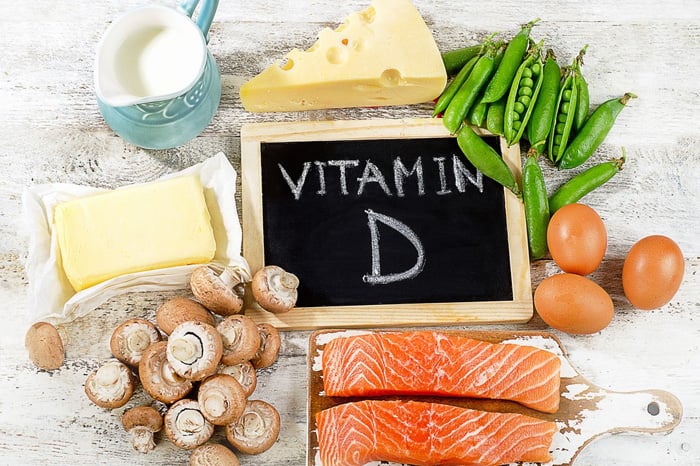
Sciency bit: Vitamin D is important for maintaining a tolerance during a pathological immune response, otherwise called a “tolerogenic immunological status” (6). This is in place of a proinflammatory interaction. Serum vitamin D levels have also been linked to tissue function (7). Another research indicates that vitamin D is involved in the activation of the T cells of the immune system (8b). Lastly, due to “ impaired localized innate immunity and defects in antigen-specific cellular immune response,” vitamin D deficiency is correlated with a higher susceptibility to infections (9). Overall, vitamin D interacts with cells from both the adaptive and innate immune system in positive ways, though there is more to be studied – particularly in relation to autoimmune diseases.
How much vitamin D do I need? 10mg per day is recommended in the UK; it’s closer to 15mg (660 IU) in the USA and a little less than 10mg in Australia. Given that it’s a fat-soluble vitamin, your body can store vitamin D in the body for later use. Too much vitamin D can be toxic, although the safe upper limit is around 80mg/day.
Sources of vitamin D: Sunlight exposure! From food: fatty or oily fish, cod liver oil, beef liver, cheese, eggs (yolks!), mushrooms, fortified foods such as milk and cereal. It’s difficult to get the required vitamin D from food alone so make sure you get plenty of sunshine and take vitamin D supplement in the winter months.
Tip: People with darker skin colour can’t synthesize vitamin D from the sun as well so they may need a supplement; the same goes for people who regularly cover up their skin or don’t spend much time outdoors (even in summer).
In a nutshell: Vitamin D affects key cells of the immune system and having adequate amount has been linked to lower susceptibility to infections and lower risk of autoimmune diseases. Make sure to get enough sunlight and eat oily fish and egg yolks! Take a supplement in winter or if not exposed to the sun, but there is no need to go overboard as too much vitamin D can be toxic.
Vitamin E
Vitamin E’s main role is as an antioxidant and it’s probably the most important of the group. It protects cell membranes from damage and helps to strengthen our defences against illness and infection. If you want healthy skin and eyes, vitamin E is also your friend.
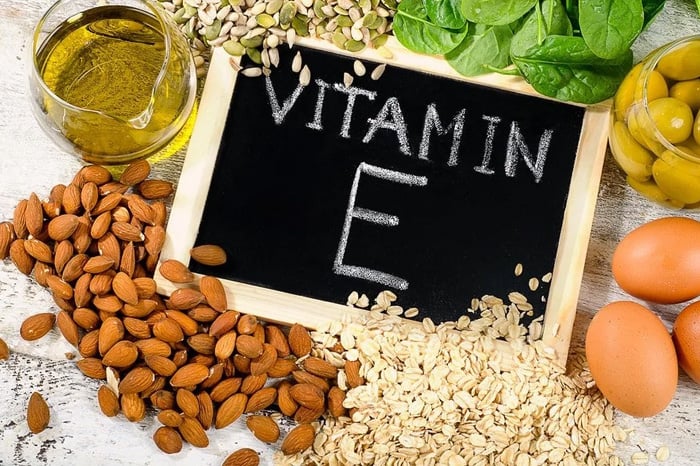
Sciency bit: Simply put, “vitamin E is a chain-breaking antioxidant that protects membranes from free-radical damage” (8). Free radical damage is a natural part of the ageing process, which is why antioxidants are exceedingly important as we grow older. Animal and human studies both show evidence of vitamin E deficiency impairing several immune functions. On the other hand, supplementation has been shown to enhance immune function and improve resistance to certain pathogens (8).
How much vitamin E do I need? 3-4 mg/day in the UK, 10 mg/day in Australia and up to 15 mg in the US; and, you should be able to get most of the required amount from your diet. Vitamin E is also fat-soluble so any excess will be stored, which means you don’t need to get the right amount every day. There is not enough evidence of what happens when you take too much vitamin E but you should be safe if you stay under 540mg per day (8c). In the US, the upper limit is 1000mg per day.
Sources of vitamin E: Nuts (especially almonds), seeds, olive oil, almond oil, avocado, avocado oil, salmon, trout, red pepper, mango, turnip greens, spinach; and, a vitamin E supplement. For example, half an avocado- 2mg, half a fillet of salmon – 2mg, while 30 grams or 1 oz of sunflower seeds – 10mg of vitamin E!
In a nutshell: Most people get adequate vitamin E through their diet, which is great because it helps to strengthen our immune system. While there is no specific need to supplement, a deficiency in this vitamin can impair several immune functions. Guacamole, anyone?
SUPPLEMENTS FOR IMMUNE SYSTEM
Probiotics & Prebiotics (Gut Health)
Gut health is highly complex, however, we know enough to determine some of the critical ties between microbiome and immunity.
The microbial network formed after birth – otherwise known as our gut – is a “consortium of bacteria [that] contains ten times more cells than the human body, 100 times the number of genes than in the human genome and has the metabolic capacity of the human liver” (10). This is why the gut is often referred to as “the second brain.”
With the rise of antibacterial soaps, antibiotic use, vaccines, sanitation, and today’s ‘standard Western diet’, our guts have inevitably changed. In some ways, we are more guarded against disease with the advances of medicine and a strong defence against germs. However, there are no distinctions between ‘good’ and ‘bad’ microorganisms which inevitably means we are killing off some of the beneficial stuff as well (10).
At the root of the gut is inflammation management. Low-grade inflammation is related to loss of immune function (11). This ultimately leads to increased gut permeability which means the ‘bad’ stuff is getting in at a more frequent rate due to the integrity of the gut lining – or lack thereof. Gut permeability is especially a concern for elderly people and after taking antibiotics.
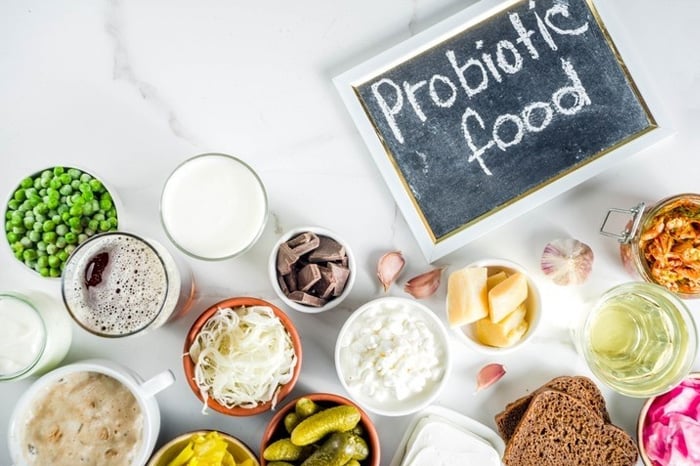
Diets including gut-friendly foods, probiotics (beneficial bacteria), and prebiotics (fuel for our good bacteria) can change the bacterial colonies that exist within us over time. One study cites, “There is increasing evidence of a link between dietary intake and changes in intestinal microbiota metabolism in the form of metabolites, and that these metabolites can have effects on the mucosal and/or systemic immune system” (11).
Probiotics: fermented foods like sauerkraut, kimchi, kefir, kombucha, aged cheese, olives, or a good supplement.
Prebiotics: fibrous and starchy vegetables, asparagus, artichokes, celery, legumes, leeks, onions, garlic, apples, bananas, seaweed, radishes. You can also find prebiotic supplements on the market.
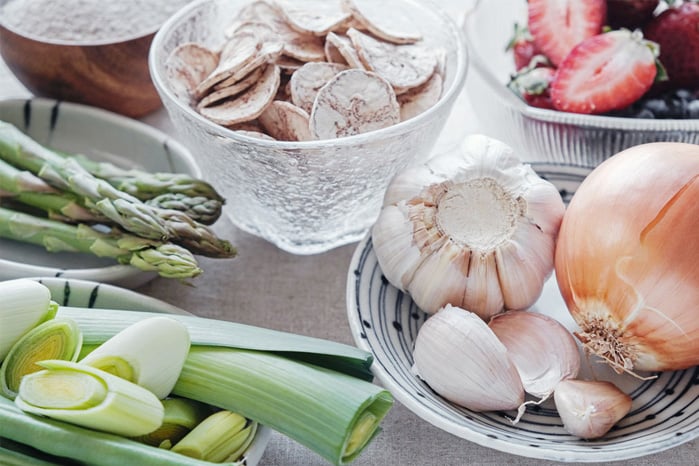
In a study that attempts to understand the gut and its impact on immune response, it is summed up pretty perfectly: “Perhaps the mammalian immune system which appears designed to control microbes is, in fact, controlled by the microbes themselves” (10).
In a nutshell: Probiotics encourage good gut health and immunity as intake can activate immune cells (17). A probiotic is also one of the most powerful supplements you can take for long-term health and promoting a healthy gut which in turn improves immune defence. The microbiome is a complicated beast, and we’re only just scratching the surface with some of the most promising links to the immune system in this section. If you’d like to learn more, you can use the references section to read complete journals. In the meantime, make some sauerkraut and enjoy some lovely asparagus and a glass of kombucha.
Elderberry
One of our favourite ‘e-words’ when it comes to immune boosters, elderberry is a popular natural remedy. Does it hold up from a scientific lens though?
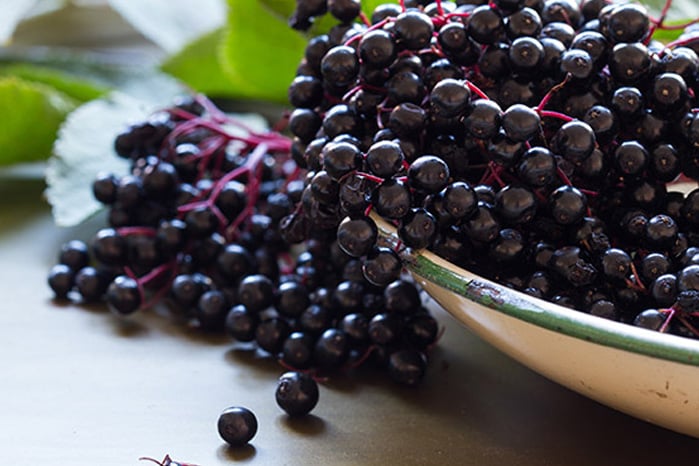
Unfortunately, most dietary supplements such as elderberry are not tightly controlled through the FDA so there are less hard facts. However, that doesn’t mean it’s not worth a shot. It has a history of being used in folk medicine as an antiviral agent – particularly for treating influenza.
Multiple studies conclude that it can be effective in reducing the duration of cold in subjects exposed to air travel (12), as an alternative to antibiotics in the case of upper respiratory illness (13), and in the treatment of influenza (14). These results are perhaps because the fruit is rather abundant in flavonoids which act as antioxidants in plants (15).
In a nutshell: Elderberry is no miracle remedy but it is packed with vitamin C, vitamin A and quercetin and its antioxidant powers are definitely helpful when it comes to boosting your immune system. No harm in making some elderberry syrup or these elderberry lozenges.
Echinacea
Another common natural remedy for the cold is echinacea. It’s a very popular herb and is often found in tea or lozenges.

Echinacea has been found to potentially reduce the length of colds but is not particularly effective in preventing it (16). It is loaded with antioxidants, such as flavonoids, cichoric acid and rosmarinic acid, which may help defend your body against oxidative stress and to keep your immune system in tip-top shape.
In a nutshell: Echinacea is not as well studied as the immune-boosting vitamins discussed above so it’s totally up to you if you want to spend the money on this supplement.
Ginseng & Astragalus
Ginseng and astragalus have been used in Chinese medicine for centuries. Both are popular for their immune-boosting attributes and considered notoriously safe even if research is inconclusive (21).
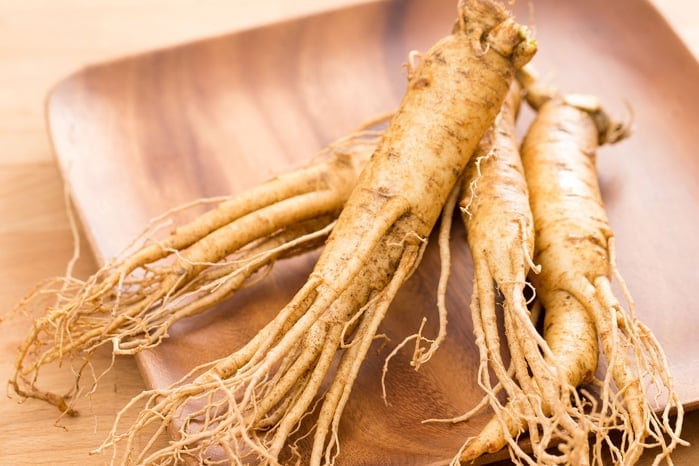
Ginseng is a popular plant extract and antioxidant with many uses. In one study, ginseng improved the efficacy of the flu vaccine and showed higher antibody concentration. In another, chronic bronchitis patients showed quicker bacterial clearance. Regular dosing may also increase helper T cell activity (18).
Another promising link to immunity – particularly in the instance of chronic illness – is its ability of ginseng to treat fatigue (19). Finally, both ginseng and astragalus may enhance immune function via “enhancement of spleen and thymus index, the proliferation of splenic lymphocytes and cytotoxic activity of NK cells” (20). Both organs are very important to the immune system; the spleen filters blood and the thymus plays a critical role in T cell production.
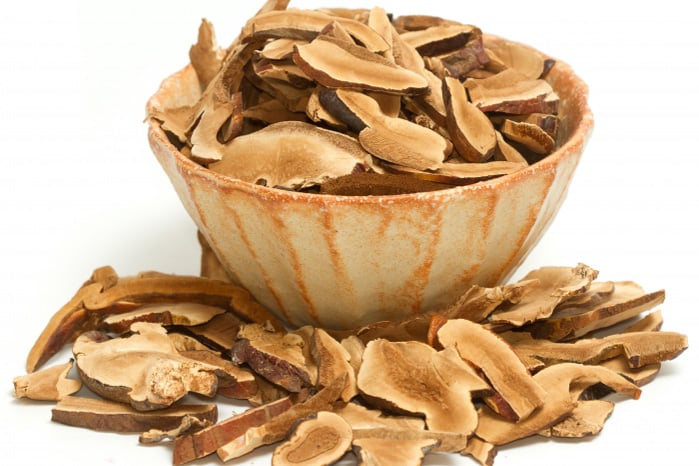
In a nutshell: If you want to dub into some Eastern medicine, ginseng and astragalus are worth looking into both for their promising links to immunity and ginseng’s ability to treat fatigue.
Curcumin
Curcumin is rather well known because it is found in turmeric, a widely known and available ‘superfood’ used in Ayurvedic medicine and various cuisines around the world.
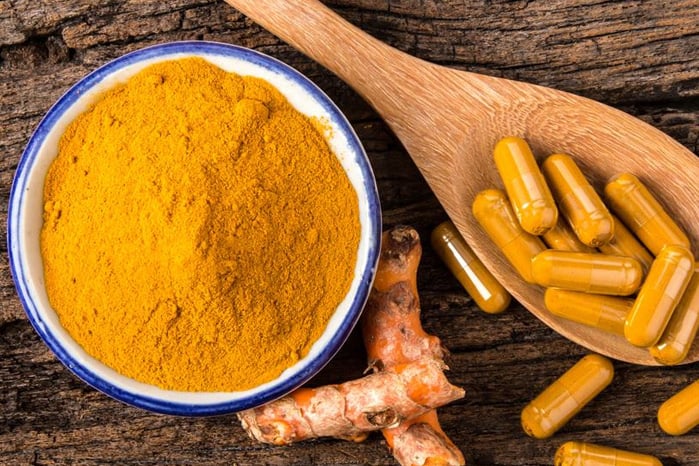
Curcumin’s claim to fame is its anti-inflammatory potential, which is linked to immune function. This compound shows antioxidant activity and acts as a scavenger of free radicals thereby reducing oxidative stress in the body. Curcumin also interacts with immune cells such as lymphocytes and macrophages and improves the system.
Overall, it exhibits antioxidant, anti-cancer, and anti-inflammatory properties in many instances (22). More research concludes that “curcumin is a highly potent antimicrobial agent and is active against various chronic diseases including various types of cancers, diabetes, obesity, cardiovascular, pulmonary, neurological and autoimmune diseases” (23).
One of the biggest barriers is its poor availability. However, it can be increased significantly by consuming turmeric or curcumin products with black pepper because it contains piperine. This compound enhances the absorption of curcumin by up to 2,000% (24).
Turmeric powder or curcumin extract? While turmeric contains decent levels of curcumin, the extract form of it is more potent and effective. You could use turmeric powder or fresh turmeric in tea, soups, curries, scrambled eggs and rice; alternatively, you can take curcumin extract supplement. A dose of 500 mg per day is pretty safe and effective.
In a nutshell: Curcumin (found in turmeric) is a safe supplement with countless benefits and even more capacity as we continue to develop an understanding of its impact within the human body. Whether you take it to boost your immune system or to lower inflammation, curcumin has many benefits and can be taken in a form of turmeric or as an extract supplement. Try my turmeric zucchini soup!
Larch Arabinogalactan
As its name suggests, this natural supplement is derived from the wood of a larch tree – a unique pine tree that drops its leaves during autumn. It is sold in supplement form, and this is the only way to take Larch Arabinogalactan.

In human subjects, it has proven to be effective in reducing the duration of the common cold (33). It may also increase the body’s defence against it in the first place, making it a good contender for preventative care when the season hits (34). Last but not least, one study shows a promising increase in antibody response to the tetanus vaccine (35).
In a nutshell: It’s an interesting supplement to look into if you find it on the market.
Bovine colostrum
Say what? Yep, you heard me. This supplement hasn’t gained much traction in most wellness communities, but it is out there. It has been used as an immune supplement since the 18th century, before penicillin (37).
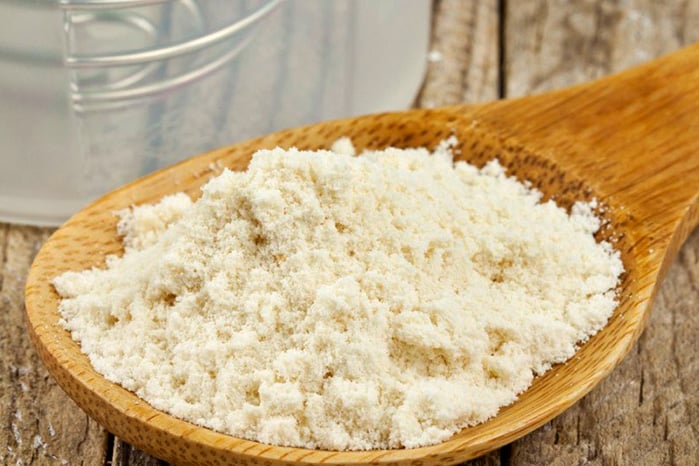
So, what’s the thinking behind it? In the first few days after giving birth, the mother produces colostrum, milk that’s rich in protein and antibodies, making it ideal for newborn babies.
Bovine colostrum is the initial milk produced by the mother cow to feed its calf. It is described as “a gift of nature used to protect the newborn’s immune system and provides passive immunity against pathogens” (36). If it could do the same for humans, it could be a powerful aid to immunity. Bovine colostrum is considered an immunological agent and has a “rapid response rate against infections.” It may also be used to negate the ill effects of immunity in athletes (37).
In a nutshell: I don’t know about you but I would rather eat an orange! Nevertheless, it’s a unique form of a supplement.
Spirulina
Spirulina is a fairly popular green superfood. It is an antioxidant-rich type of blue-green algae. It has been shown to stimulate the production of antibodies (38) and improve the growth of the good bacteria in our guts (39), which we know is beneficial for our immune system. Due to its antioxidant properties, it will naturally fight against oxidative stress.
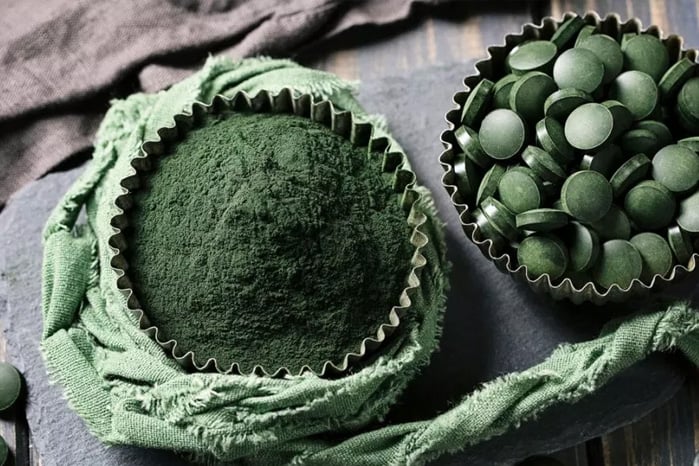
In a nutshell: It is an easy addition to the diet if you often drink smoothies but it can be expensive. While it has potential benefits in boosting your immune system, spirulina isn’t more superior to regular fruit and vegetables.
What else can we do to strengthen the immune system?
Optimise Your Diet
Micronutrients – water-soluble vitamins, fat-soluble vitamins, macrominerals and trace minerals – are critical to immunity as deficiencies suppress the immune function. While vitamin C, E, and D are conclusively linked, adequate intake of vitamins B6, folate, B12, and of minerals selenium, zinc, copper, and iron supports the immune system (9).
In a nutshell: Eating a healthy diet rich in the aforementioned vitamins, prebiotic and probiotic foods, anti-inflammatory foods, and micronutrients is perhaps one of the best ways to maintain a healthy immune system. With a focus on real food and conscious supplementation based on your own individual needs, you should have no trouble meeting all requirements.
I have lots of healthy, nutrient-dense recipes on the site, check them out here.
Exercise smart
Physical activity is a powerful prescription for many ailments and especially as a preventative measure. Depending on the intensity, exercise can have varying effects on the immune system.
Athletes are at higher risk of suppressed immunity and developing respiratory infections. Intensive exercise combined with mental pressure and long-haul travel can alter several immune parameters and impair immune cell function. Another risk is decreased carbohydrate intake; in athletes, high carbohydrate intake and high protein intake combined are vital to energy and immunity (26, 27). Low-carb diets in athletes “may increase the immunosuppressive stress hormone response to exercise” (25).
On the other hand, moderate-intensity exercise can have a positive impact on the immune system. If we look at the root of that improvement, it can be drawn back to lowering inflammation, thymic mass, altering immune cells, and stress reduction. It may even enhance vaccine efficacy (28).
In a nutshell: Exercise regularly but not too much. If you do perform higher intensity exercise on a regular basis, make sure to rest well and to optimise your diet to suit your activity levels (see the previous point!).
Sleep
The circadian rhythm directs a lot of our basic functions and how well we feel, so unsurprisingly, sleep affects the immune system.
Sleep deprivation – especially night after night – sets the body up for a constant influx of low-grade inflammation as well as immunodeficiency. Prolonged sleep deficiency also produces pro-inflammatory cytokines. This is important to know because much of the reason sleep impacts immune health so directly is due to shared communication signals between the immune system and the central nervous system. The two share neurotransmitters, hormones, and cytokines. The sleep cycle and immune functions possess a lot of uncanny parallels (30).
In a nutshell: Sleep deprivation leads to impaired immunity so make sure to get plenty of rest! Find tips for better sleep here.
Stress management
It may not surprise you to learn that increased and prolonged exposure to stress as well as depression increase the likelihood of contracting infections and impair the immune system (31, 32).
Stress is known to “blunt cellular immunity, as characterized by reductions in lymphocyte mitogenic responses and natural killer cell activity” (32). In one study, yoga was shown to lower stress levels and “enhance mucosal immune function,” making the connection between the two (29).
Practising stress relief in your self-care routine in addition to getting enough sleep is critical for immunity. Effects seem to accumulate over time, so fostering healthy habits is ideal for warding off illness. Roll out that mat!
Conclusion
Wow, you made it to the end! I hope you found this article interesting and useful. As you can see, the immune system is truly a tangled web. It is amazing how many components really come together to keep us healthy!
When it comes to essential vitamins and minerals, most evidence shows that it’s not so much about whether having extra will boost your immune system but rather that not having enough can definitely suppress it. Avoiding nutrient deficiencies is your best defence!
If you’re starting to feel a little run down or under the weather, it can be helpful to increase the intake of vitamin C and E, as well as zinc and to get some sunshine (or Vitamin D supplement) but there is no need to go overboard. Food sources are always best!
It is important to focus on a low-stress lifestyle, good sleep hygiene, moderate exercise, healthy eating, and supplements when necessary. By paying good attention to these facets of lifestyle, we can hopefully increase our defence – especially during sick seasons and global health scares.
It is also worth mentioning that washing your hands, cleaning surfaces thoroughly, and avoiding the spreading of illness when you are already infected are some of the most powerful measures for staying safe.
Irena!
Special thanks to my assistant writer Alex Barone for helping me collate a lof of the information for this article!
REFERENCES & RESOURCES
1. How does the immune system work?
2. How does the immune system work for cancer?
3.Vitamin C and Immune Function
4. Immune-enhancing role of vitamin C and zinc and effect on clinical conditions
5. Zinc as a Gatekeeper of Immune Function
6. Vitamin D and Immune Function
7. Role of vitamins D, E and C in immunity and inflammation.
8. Impact of vitamin E on immune function and its clinical implications
8b.Vitamin D as Immune System Boost
8c. Vitamin E Fact Sheet
9. Contribution of selected vitamins and trace elements to immune function.
10. The gut microbiome shapes intestinal immune responses during health and disease.
11. Diet, the intestinal microbiota, and immune health in ageing
12. Elderberry Supplementation Reduces Cold Duration and Symptoms in Air-Travellers: A Randomized, Double-Blind Placebo-Controlled Clinical Trial.
13. Black elderberry (Sambucus nigra) supplementation effectively treats upper respiratory symptoms: A meta-analysis of randomized, controlled clinical trials.
14. Randomized study of the efficacy and safety of oral elderberry extract in the treatment of influenza A and B virus infections.
15. Elderberry
16. Echinacea for Preventing and Treating the Common Cold.
17. Beneficial Effects of Probiotic Consumption on the Immune System
18. Panax Ginseng
19. Ginseng as a Treatment for Fatigue: A Systematic Review.
20. Systematic exploration of Astragalus membranaceus and Panax ginseng as immune regulators: Insights from the comparative biological and computational analysis
21. Ginseng: A dietary supplement as immune-modulator in various diseases
22. Bioactivity, Health Benefits, and Related Molecular Mechanisms of Curcumin: Current Progress, Challenges, and Perspectives
23. Curcumin, the golden nutraceutical: multitargeting for multiple chronic diseases
24. Influence of piperine on the pharmacokinetics of curcumin in animals and human volunteers.
25. Recommendations to maintain immune health in athletes
26. Immune nutrition and exercise: Narrative review and practical recommendations
27. Immunity in athletes.
28. Exercise and the Regulation of Immune Functions
29. Yoga stretching for improving salivary immune function and mental stress in middle-aged and older adults
30. Sleep and immune function
31. Stress, immunity and mycotic diseases
32. Stress, Depression and the Activation of the Immune System
33. Does larch arabinogalactan enhance immune function? A review of mechanistic and clinical trials.
34. Larch arabinogalactan effects on reducing the incidence of upper respiratory infections
35. Immunomodulatory Effects of ResistAid™: A Randomized, Double-Blind, Placebo-Controlled, Multidose Study
36. Bioactive Compounds of Colostrum and Its Application
37. Bovine colostrum: benefits of its use in human food
38. The antioxidant, immunomodulatory, and anti-inflammatory activities of Spirulina: an overview
39. Antioxidant, Immunomodulating, and Microbial-Modulating Activities of the Sustainable and Ecofriendly Spirulina.
40. Vitamin D Fact Sheet UK
41. Vitamin D Fact Sheet USA
42. Dietary Reference Intakes for Vitamin C, Vitamin E, Selenium, and Carotenoids
43. Vitamins & Minerals NHS
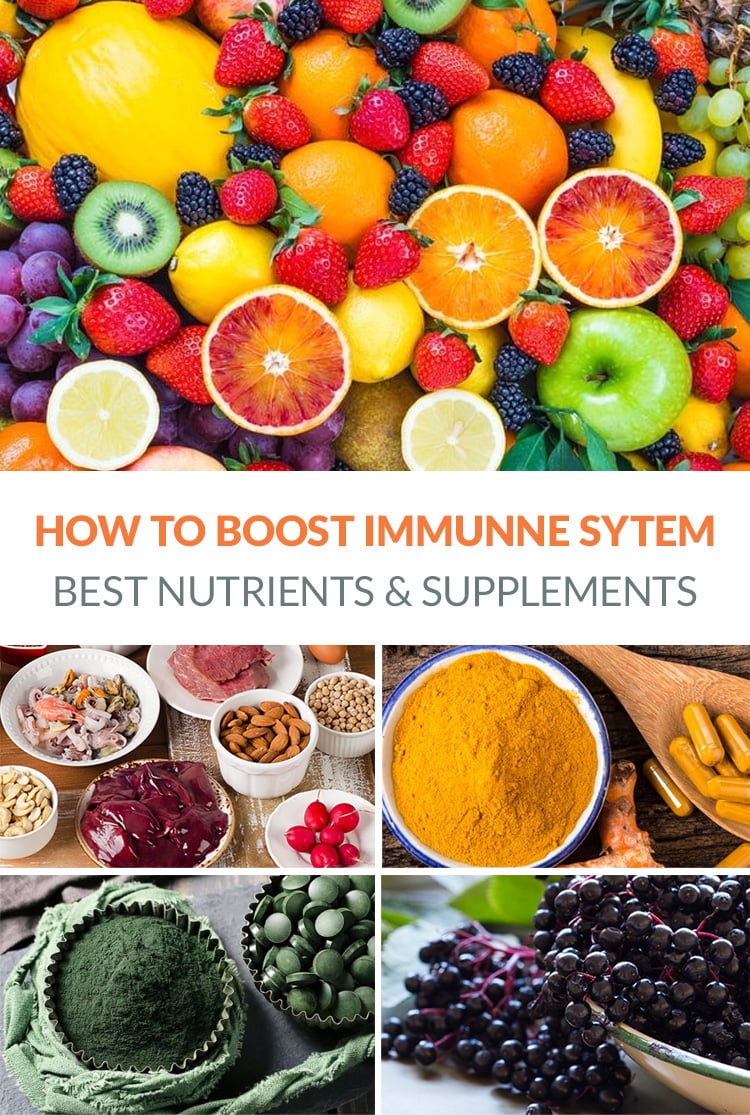

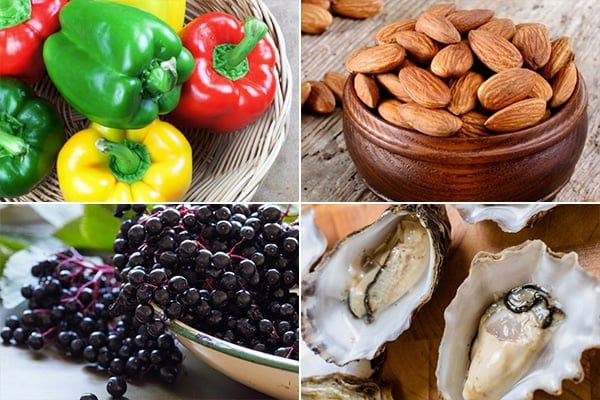

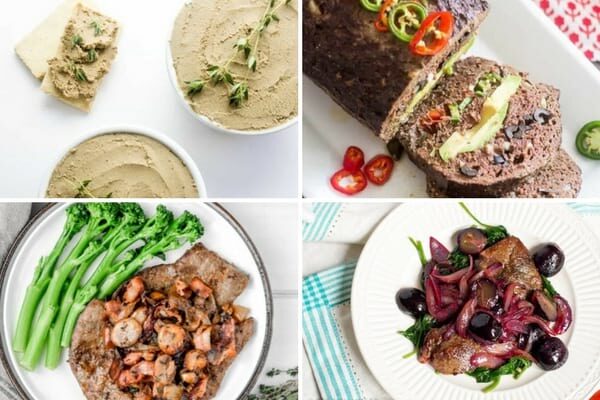
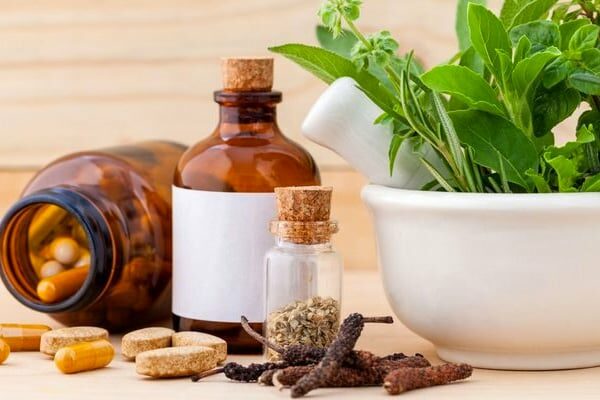
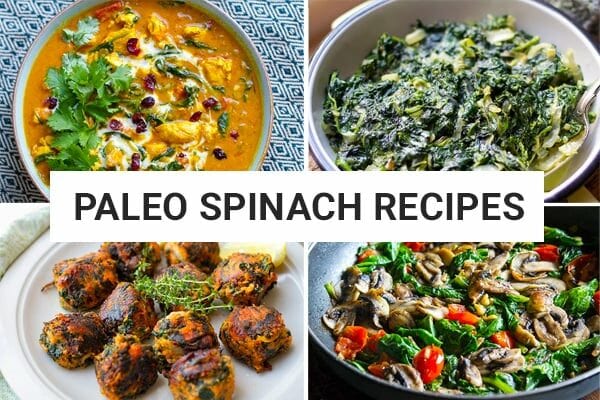
Comment or Rate This Recipe
Made the recipe? Please leave a rating as it helps other readers to discover this dish. You don’t need to leave a comment if rating a recipe, unless it’s 3 stars or below.
Comments
0 Comments